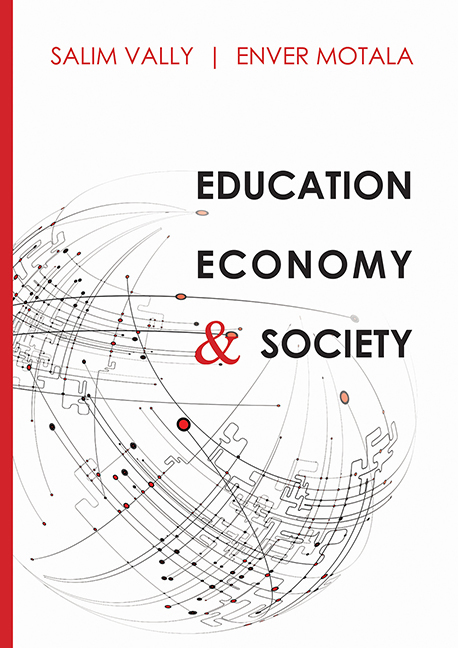Book contents
- Frontmatter
- Contents
- Foreword
- Preface
- About the contributors
- Acknowledgements
- Abbreviations and acronyms
- Chapter 1 ‘NO ONE TO BLAME BUT THEMSELVES’: Rethinking the Relationship between Education, Skills and Employment
- Chapter 2 EDUCATION AND ECONOMY: Demystifying the Skills Discourse
- Chapter 3 UNIVERSITIES AND THE ‘KNOWLEDGE ECONOMY’
- Chapter 4 GOING AROUND IN CIRCLES: Employability, Responsiveness, and the Reform of the College Sector
- Chapter 5 BUILDING A TRANSFORMATIVE PEDAGOGY in Vocational Education
- Chapter 6 SKILLS? WHAT SKILLS? JOBS? WHAT JOBS? An Overview of Research into Education/Labour Market Relationships
- Chapter 7 DEBATING THE NEXUS of Education, Skills and Technology in the Age of Lean Production: A Case Study of the ArcelorMittal Vanderbijlpark Plant
- Chapter 8 SKILLS, JOBS AND DECEPTION: Examples from the South African Workplace
- Chapter 9 ON THE USE AND ABUSE OF EDUCATION: Reflections on Unemployment, the ‘Skills Gap’ and ‘Zombie Economics’
- Chapter 10 THE YOUTH WAGE SUBSIDY in South Africa: Employment, Skills and ‘Churning’
- Chapter 11 EPISTEMIC INJUSTICE and the Struggle for Recognition: Human Dignity and the Recognition of Prior Learning
- Chapter 12 (RE)CLAIMING WORKERS' EDUCATION
- Chapter 13 SKILLS DEVELOPMENT in Post-Apartheid South Africa: Issues, Arguments and Contestations
- Index
Chapter 10 - THE YOUTH WAGE SUBSIDY in South Africa: Employment, Skills and ‘Churning’
Published online by Cambridge University Press: 16 February 2020
- Frontmatter
- Contents
- Foreword
- Preface
- About the contributors
- Acknowledgements
- Abbreviations and acronyms
- Chapter 1 ‘NO ONE TO BLAME BUT THEMSELVES’: Rethinking the Relationship between Education, Skills and Employment
- Chapter 2 EDUCATION AND ECONOMY: Demystifying the Skills Discourse
- Chapter 3 UNIVERSITIES AND THE ‘KNOWLEDGE ECONOMY’
- Chapter 4 GOING AROUND IN CIRCLES: Employability, Responsiveness, and the Reform of the College Sector
- Chapter 5 BUILDING A TRANSFORMATIVE PEDAGOGY in Vocational Education
- Chapter 6 SKILLS? WHAT SKILLS? JOBS? WHAT JOBS? An Overview of Research into Education/Labour Market Relationships
- Chapter 7 DEBATING THE NEXUS of Education, Skills and Technology in the Age of Lean Production: A Case Study of the ArcelorMittal Vanderbijlpark Plant
- Chapter 8 SKILLS, JOBS AND DECEPTION: Examples from the South African Workplace
- Chapter 9 ON THE USE AND ABUSE OF EDUCATION: Reflections on Unemployment, the ‘Skills Gap’ and ‘Zombie Economics’
- Chapter 10 THE YOUTH WAGE SUBSIDY in South Africa: Employment, Skills and ‘Churning’
- Chapter 11 EPISTEMIC INJUSTICE and the Struggle for Recognition: Human Dignity and the Recognition of Prior Learning
- Chapter 12 (RE)CLAIMING WORKERS' EDUCATION
- Chapter 13 SKILLS DEVELOPMENT in Post-Apartheid South Africa: Issues, Arguments and Contestations
- Index
Summary
Introduction
How did a relatively small, ancillary labour market policy become the centre of an intense public contest that led to a violent confrontation between the Congress of South African Trade Unions (COSATU) and the Democratic Alliance (DA) on the streets of Johannesburg? The answer is not immediately obvious. When wage subsidies were first proposed around the transition period (admittedly with certain major variations on the contemporary iteration), it was economists on the left – Marxists and Post-Keynesians – who were their chief advocates. Wage subsidies are fairly common around the world – perhaps the majority of advanced economies have some experience with them – but it is not clear whether they have ever drawn the rancour of unions in the way they did in South Africa. In fact it is the sections of the right that bristle at the prospect of the state tinkering in markets that have been the most vocal opponents of such policies. Now it is business that champions the subsidy.
Explaining why the youth wage subsidy (YWS) became the site of such adversity will be the aim of the second half of this chapter. It is a story that offers insights into many of the most salient political and sociological developments of post-apartheid South Africa. The YWS commands a degree of public attention that is hugely disproportionate to its likely economic impact, even by the most optimistic predictions. In part this is due to its instinctive appeal in a country desperate for a cure to an entrenched unemployment crisis and to its elevation by a media dominated by business driven cures to that crisis. But perhaps more importantly its high public status is the work of an opposition party, the DA, desperate for a means of appealing to a constituency to which it is not naturally adapted and to articulate clear differences to the economic policy of the ruling party.
The first half of this chapter will provide a socio-economic assessment of the YWS. The designers of the policy and its major supporters conceived it as an intervention into a job-deficient economy whose primary ailment is a lack of adequate skills, compounded by high rigid wages. The inadequacies and fallacies of this view are a leit-motif of this volume. The chapter critiques the economic logic of the YWS and is centrally concerned with the effect it will have on youth employment and skills.
- Type
- Chapter
- Information
- Education, Economy & Society , pp. 190 - 212Publisher: University of South AfricaPrint publication year: 2014

